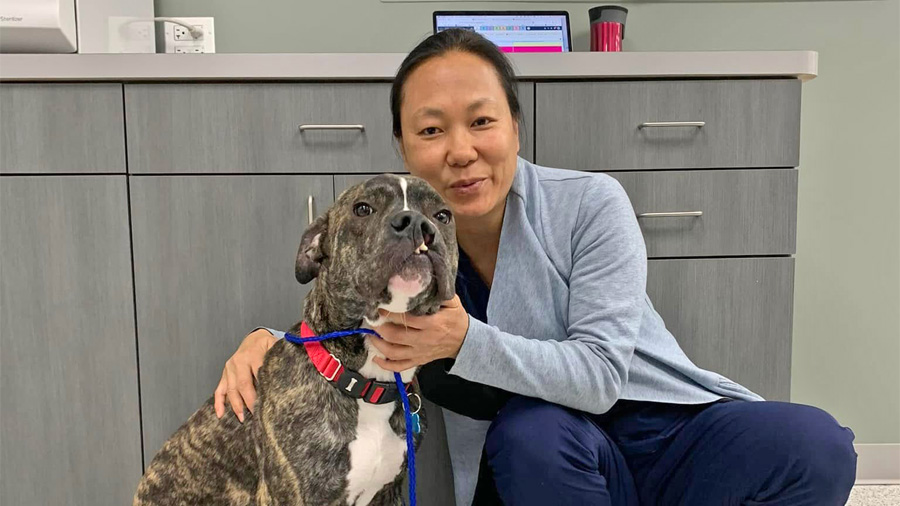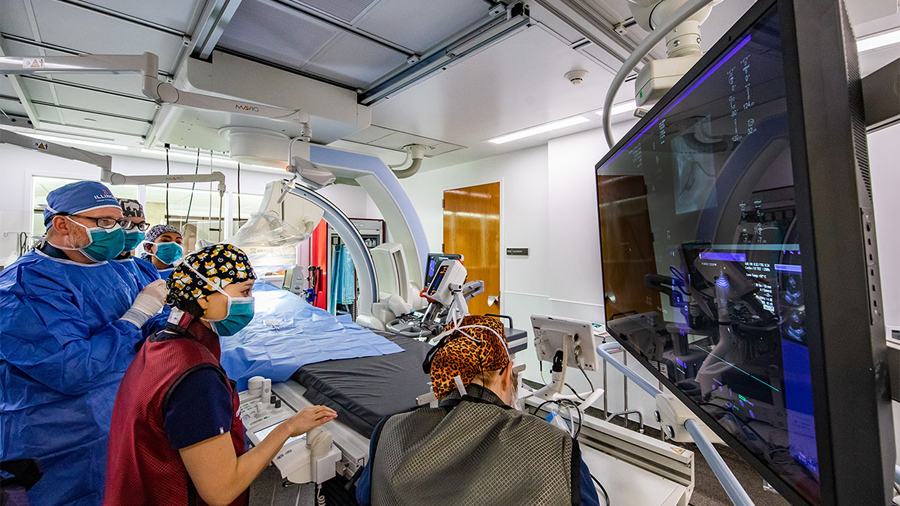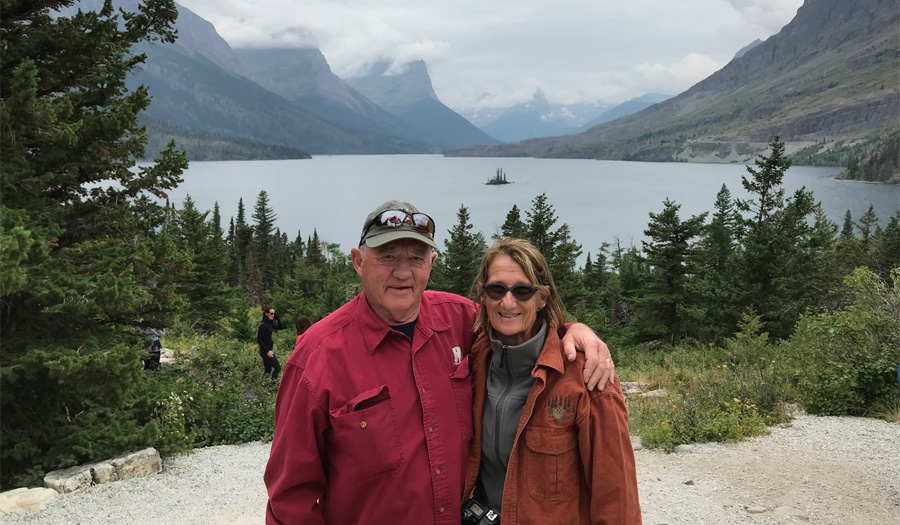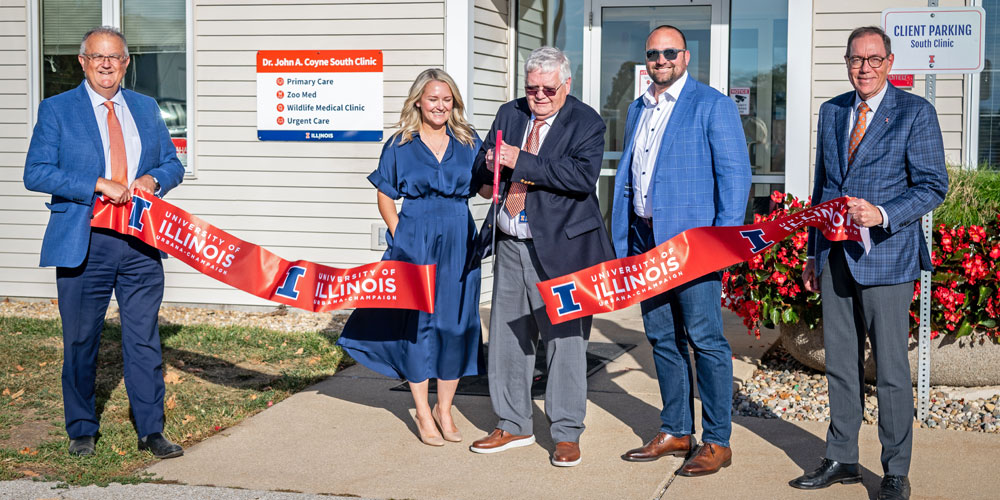Dr. Jessica L. Von Waldau is a 1997 DVM graduate of the University of Illinois . She is also the co-founder of Shelter Veterinary Solutions, a Chicago-based hospital that provides quality veterinary care incorporating shelter medicine best practices for animal rescue organizations.
As an infant, she was found in a parking lot, abandoned, with no name, no birth date, and no one to claim her.
Later, after she was adopted from an orphanage, she left South Korea on an airplane full of other adoptees for her new home and family. She didn’t know the language and now had a full family including a brother and two dogs.
Soon after she saw a doctor for intestinal problems and malnutrition. Her mom had to find a pharmacy to make a dose of medication so she could get rid of the parasites.
Many other things were new.
“I had never seen so much food and would often put too much on my plate and fall asleep in my dinner,” she remembers.
At the orphanage, she didn’t have her own toys, clothes, or bedroom. Now she fell asleep with toys in her bed and changed clothes multiple times a day. That is, until her mom said she’d have to do her own laundry.
“So I am a stray that was brought to a shelter, had parasites and malnutrition, was put on transport, adopted into a family, learned a new language, and I thrived,” said Dr. Von Waldau. “Now I care for animals that are in similar circumstances.”
A Childhood out in Nature
Growing up, she always had pets in the family. She played in the woods and observed everything from plants and fungi to ants and birds. After storms, she’d run along the beaches and toss creatures back into the water, determined that maybe a few would swim back to the ocean.
Once, one of her pets was hospitalized for heartworms. She biked daily to the vet to see her dog, examining the microfilaria under a microscope. She asked if they could have prevented it.
Her interests became clear during high school. She worked at a local general practice and took advanced courses in chemistry, physics, and biology. She read Nature, Smithsonian, and National Geographic, and to this day remembers reading about artificial hearts.
So she began thinking about what she would like to do for a career and considered biomedical engineering and veterinary medicine.
“By the time I was done with high school, I decided that veterinary medicine would be best for me as both my soul, my brain, and my hands would love this line of work,” Dr. Von Waldau reflected.
Veterinary Studies at the University of Illinois
Pursuing undergraduate studies at the College of Agriculture, Dr. Von Waldau focused on taking all the required classes for her veterinary school application. She made the most of those years, obtaining an artificial insemination certification for dairy cattle, joining the pre-vet club, and assisting her academic advisor’s graduate and PhD students with their research studies.

Her efforts paid off.
“I was so happy when I got accepted into the U. of I. College of Veterinary Medicine early after two years of intense undergraduate studies.”
While in veterinary school, Dr. Von Waldau volunteered at the Wildlife Medical Clinic for 3 years. She also worked in one of the college’s DNA research labs.
“This volunteer work and lab work along with the veterinary school class experience helped me determine that I was best suited for hands-on work in veterinary medicine rather than research.”
Just as she had in high school, she sought out different experiences, then drew conclusions from them to determine her next steps. Dr. Von Waldau graduated from the College of Veterinary Medicine in 1997.
Working in General Practice and a Private Shelter
In the early years of her career, Dr. Von Waldau worked in small animal general practice and also treated some exotic animals and wildlife. She enjoyed teaching hands-on skills like dental x-rays, dental nerve blocks, and clinical laboratory tests to vet techs, vet tech students, and assistants.

However, after 6 years in general practice, she changed jobs and decided to fill in as a relief spay/neuter surgeon at a private shelter in Chicago. That quickly led to her being hired as their chief veterinarian.
“I have stayed in the shelter medicine world since then,” she explained.
At the private shelter, Dr. Von Waldau worked in a wide variety of areas. She developed protocols, made and implemented changes, worked with Purdue’s Maddie’s Fund Shelter Medicine Fellows, and launched and ran mobile community medicine vaccine clinics and mobile spay/neuter services in Chicago.
She introduced additional dental and surgical services for their in-house shelter animals, also installing ultrasound and x-ray equipment in their shelter’s hospital. During the canine influenza and COVID outbreaks, she defined protocols to continue running the hospital safely. She also trained new veterinarians and student externs.
She even consulted on construction projects while also performing a large number of surgeries at the high-volume spay/neuter clinic.
“Even on my ‘off days’ I would do relief work at private vet hospitals and work community vaccination clinics for the Cook County Rabies program,” she said.
After working at the private shelter, she performed surgeries and consulted for multiple other shelters. The issue was that it required a lot of driving to many locations.
Filling Unmet Needs in the Chicagoland Area
“A few years ago, I decided that I needed to figure out how to continue working more optimally within shelter medicine. That’s when my business partner and I decided to start our own hospital, and Shelter Veterinary Solutions is the result.”
Dr. Von Waldau started the hospital with Dr. Barbara Kompare, one of the Purdue shelter medicine fellows she mentored at the private shelter. Dr. Kompare had stayed on after her fellowship, so they worked together for many years.

“Her skills in medicine and mine in surgery and dentistry are complementary. Plus, we already respected each other’s skills and commitment to shelter medicine.”
They came up with the idea to remain in shelter medicine without being directly under a shelter.
“I don’t know of any other veterinary hospital in the Chicagoland area doing the type of work that we do for these types of patients and clients,” she added.
Shelters and rescues come to them asking to be clients. After signing up, they make appointments for veterinary services. Shelter Veterinary Solutions has been able to provide wellness care, sick patient care, hospitalization, diagnostic services, spay/neuter, dentistry, other surgical procedures, behavioral consultations, consulting on disease outbreaks, and consulting on building/remodeling and equipment purchasing.
Many of their clients find them through word of mouth.
“The Chicagoland area has a lot of rescues and shelters. Most of them are foster-based. What they don’t have is easy access to veterinary care. Shelter Veterinary Solutions has readily available appointments since we are not open to the public. The range of services we provide has also helped rescues keep their overall costs down by not having to utilize expensive specialty and ER centers as often.”
Supporting the Next Generation of Shelter Medicine Veterinarians
As for next steps, they are looking to hire another like-minded veterinarian. They’re always looking for vet techs and assistants, too.
“We hope to continue providing care to the animal welfare community but know that we need to help train the next generation,” she said.
In the years since she graduated in 1997, shelter medicine has undergone many changes. Dr. Von Waldau experienced this and knows that veterinarians struggle financially, and that shelter medicine often doesn’t pay as well as other areas of veterinary medicine. While setting up a scholarship at the U. of I., she also talked with Dr. Laura Frazier, who leads the college’s community medicine and shelter medicine program.
“But shelter medicine veterinarians are a very dedicated and determined set of people. I wanted to help encourage veterinary students to pursue shelter medicine or at least consider how they can help the animal welfare community,” she pointed out.
The scholarship is available to two students, and she hopes that the amount will make a difference.
“I think this scholarship I helped set up makes a significant impact on the individual student, and in that way, I hope that it makes an impact on the shelter medicine discipline.”
Dr. Von Waldau really enjoyed meeting one of the scholarship recipients at the college’s 2025 Awards & Scholarships Celebration. Both recipients wrote her thank-you notes and shared details about themselves. While visiting the college, Dr. Von Waldau also toured the Veterinary Teaching Hospital with her classmate Dr. Julia Whittington.
An Eye to the Future
Looking to the future, Dr. Von Waldau sees more people in the veterinary community considering how to help shelter animals and provide them with a spectrum of care so fewer animals are relinquished to shelters in the first place.
She also hopes to find the next generation to continue the work that Dr. Kompare and she have started at Shelter Veterinary Solutions.
“Perhaps a future scholarship recipient will open a similar hospital or low-cost community clinic to provide access to care, resulting in fewer owner surrenders to shelters,” she said.
To learn more about awards and scholarships, please email advancement@vetmed.illinois.edu.




